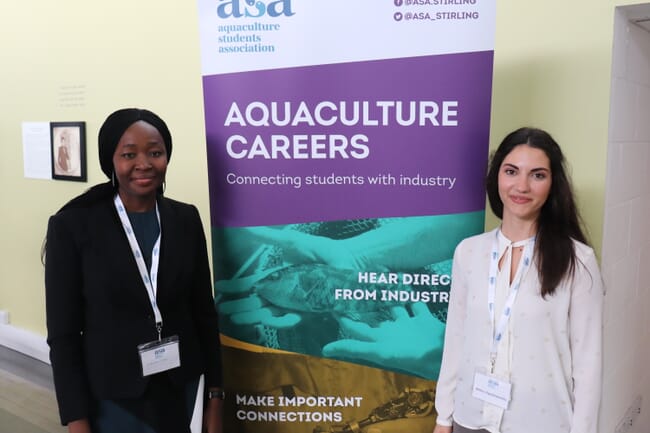This was the message delivered by Ben Hadfield, CEO of Marine Harvest Scotland, to over 140 students gathered yesterday in Stirling’s Institute of Aquaculture for the fourth edition of the Aquaculture Careers Day.
Hadfield (41), who is also COO of Marine Harvest’s global feed division, outlined how a passion for fish and a willingness to work hard had combined to propel him to the top of the seafood industry within 14 years of starting his MSc.
And his advice to the assembled student included a number of key points, not least a willingness to put in a shift at the sharp end of the industry, rather than remaining in research roles.
“If you can finish your MSc, you need two years in farming, or a year in farming. Don’t go and do three months, that’s a gap year, that’s something you do for entertainment. Go and work in a farm or a hatchery or a processing facility for a year or two years,” he urged.
After completing their studies he urged students intent on impressing those at the top level of the world’s thirst largest seafood company, to work their way up to a farm manager’s position and oversee at least one production cycle. Moreover, he added, it was essential to maintain an awareness of the financial realities of running a business.
“In any business finance and strategy rule. You need to be a good biologist but will benefit from a solid financial and strategic mind,” he explained.
Hadfield’s talk was followed by an entertaining series of presentations, largely from alumni of the institute, who had gone on to colourful – and often extremely varied – careers within the industry.

Jason Cleaversmith, recently appointed general manager of Akva Group Scotland, outlined the range of opportunities available and constant evolution of the industry as being massive draws.
“The great thing for me is that because the industry’s so young, there’s immense scope for growth in terms of innovation and growth… Change will be a consistent theme in the industry,” he explained.
Philip Lyons recently joined aquafeed manufacturer Coppens International as a research scientist, having completed his MSc and PhD at Stirling, and spoke to students about how well-placed they were for a career in the industry.
“The training received at Stirling facilitates a very easy transition into the industry, especially from a research perspective,” he observed.
Julio Lopez, now at Elanco, graduated from Stirling 20 years ago, and outlined a career that had taken him to roles researching penaeid shrimp nutrition in Ecuador, a PhD in larval feed research in Japan and seabream farming in the Canaries.
“This is a very good time for fish health professionals, very good time to be in this field, not only pharmaceuticals but in general,” he concluded.
It was a sentiment that was echoed by Ralph Bikerdike, head of fish health for Scottish Sea Farms, who had previously been at BioMar for 13 years. “The industry needs more fish health and welfare people, and technical people, to meet the increasing health challenges in both the freshwater and marine environments,” he said.
Common recommendations for those wishing to forge a career in aquaculture that emerged from the talks were the willingness to travel and adapt and a willingness to start at the bottom. In return those who did get involved could look forward to all manner of opportunities, all over the world.
“What we learn here [at Stirling] is the foundation for your career if you want to go commercial,” noted James Deverill, commercial director of Cargill Aqua Nutrition Scotland.
He went on to describe a roller-coaster career that had kicked off installing farm management software in farms around the west of Scotland, but had offered all manner of options - particularly now he was involved in one of the world's largest food firms, as one of 150,000 employees.
“Getting into Cargill opens up a whole world of opportunities – literally the globe,” he concluded.



